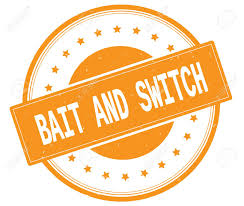
You Can Make Big Money In Real Estate!
Read about the warning signs!

Aiming to have a more meaningful and fulfilling life.
Real estate professionals who are well respected in the industry often focus on the practical aspects of their products or advice, rather than emphasizing the lifestyle associated with them. They are not trying to create an image of wealth and extravagance, but rather to provide education and information to potential buyers. On the other hand, those who are less reputable may attempt to entice buyers with promises of glamour and luxury, often accompanied by flashy accessories.

Subjective self-description.
Those I respect for their knowledge and expertise tend to avoid the use of subjective language and embellishments to describe themselves. Instead, they focus on factual information and relevant details about their experience and work. Additionally, they also avoid images that might suggest a level of success that is not true.

Avoiding Missteps and Errors.
The gurus I respect are meticulous in their self-description, relying on factual information and relevant details instead of using subjective and embellished language. Additionally, they also abstain from using images that could suggest a level of success that has not been achieved. By focusing on accuracy and avoiding any missteps or errors, they ensure that their descriptions remain honest and truthful.

No bad news.
The main reason B.S. artists always respond to bad news in a Pollyanna fashion is to maintain their credibility and to keep their audience encouraged. By denying reality, they make it easier for their customers to keep their optimism up and to keep investing in real estate. They also want to avoid scaring people away from investing, as well as appearing to be out of touch with the markets. By presenting the bad news in a positive light, they are able to maintain their reputation as an expert in the field and keep their customers interested in investing.

This tool works well for most cases.
Real estate investments require careful consideration of the situation and goal to determine the most suitable technique. Different techniques have different advantages and disadvantages, and many are only suitable for a limited range of circumstances. Just as no tool is appropriate for every mechanical job, neither is any real-estate-investment technique appropriate for every situation. It is important to note that some individuals may attempt to use complex techniques to impress, but they may not be appropriate for the given situation. It is important to be aware of this and not be swayed by these techniques. The most suitable technique should be selected based on the situation and goal at hand.

Emphasis on the motivational material.
Motivational materials can be a great source of encouragement and support, but it is important to be aware of materials that are not authentic. Fake motivational materials can be damaging to one’s self-esteem, as they are often designed to manipulate and control people. False promises of success and wealth can lead to feelings of inadequacy and disappointment when the expected outcome is not achieved. Fake motivational materials can also lead to disillusionment, as they can give people a false sense of security and make them believe that they can achieve something they are not capable of. It is important to take the time to verify that the materials you are consuming are authentic and not just empty promises. Authentic motivational materials can be a great resource to help people set and reach their goals, but it is important to be aware of fake materials that can be detrimental to personal growth.

Claim to do lots of deals.
Many people who teach investment techniques claim they use them in their own programs, but they actually don't have the time to do so. Being an expert in real estate takes a lot of work and time, like reading lots of trade journals, and books, researching legal cases, as well as managing the business side of being a guru. Even if a real estate guru claims to do a lot of deals, they might be lying or their deals may be illegal. To tell if someone is telling the truth, ask them for the addresses of their properties. If they can't provide them, they are lying.

Offer to invest in your deals.
Bad real estate gurus are nothing more than salesmen. They target those who don't have much money to invest, so they often encounter the objection, "I don't have money to invest." To overcome this, some have been falsely claiming they will invest in deals brought to them by their students. This is a variation of the classic advance-fee-loan scam. The so-called gurus won't provide any addresses to prove the deals, as other investors and developers do. It's likely that they've only invested in a few deals, if any, just to say they did. Moreover, their techniques for buying nothing down don't work in the real world. It's all a lie to get people to part with an advance fee for a weekend class.

Emphasis on no-down, low-down techniques.
In recent years, real estate scams have become increasingly sophisticated and difficult to spot. Scammers are now using no-down and low-down techniques that allow them to purchase a home without putting down a large down payment. These techniques can be devastating to unsuspecting buyers, as they can find themselves in deep debt with no way to pay it back. The Federal Trade Commission (FTC) is warning potential buyers about these no-down and low-down techniques. They have warned that scammers may use deceptive techniques and false promises to convince buyers to sign contracts that are not in their best interests. These contracts can have hidden fees and other costs that can cost the buyers thousands of dollars. The FTC also warns that scammers may use inflated appraisals to make the property seem more attractive, and may even offer financing that is impossible to obtain. It's important to do your research before signing any real estate contracts, and to watch out for any suspicious activities. Buyers should also be aware of all the terms of the contract and understand any risks that come with it. Doing your due diligence can help protect you from getting scammed.

Blank paper and/or filler.
BS artists’ books are a form of scam that take advantage of people who are eager to learn how to succeed in business, investing, or other entrepreneurial pursuits. The books are often filled with content that is repeated over and over, with only slight variations, such as directories of government agencies or blank forms. They also contain a lot of blank space, due to double-spacing, huge margins, and large type. These books are sold for high prices, in the range of hundreds or even thousands of dollars, despite their low page count, which would only be a few dollars in a bookstore if they were typeset with normal margins, type size, and space between lines and paragraphs.

Gorgeous packages.
Glorious packaging in real estate seminars is a scam that promises huge profits with little risk. It is a way for scam artists to make a quick buck off of unsuspecting buyers. The packages often contain outdated or incorrect information, making them a waste of money. Real estate investing requires a lot of knowledge and hard work, so it is important to do your research and make sure you are working with a legitimate real estate investing professional.

No indexes.
Real estate scammers who leave out the index out of their books are a total sham, as it is a basic requirement of the industry. This demonstrates an extreme level of incompetence on the part of the scammer, as they are not knowledgeable enough to even include such an important element in there textbook. It is a clear sign to stay away from such an individual.

No acknowledgments.
Is it really too much to ask for some recognition of the people who helped us along the way? It takes little effort, is traditional and polite, yet many B.S. artists still leave out an acknowledgment section in their books. What kind of character is that? It wouldn't even cost them anything to express a few words of gratitude – they could easily put it on one of their many blank pages. Let us not forget to thank those who have contributed to our success.

No bibliography.
A scam artist is someone who uses deception, fraud, or other unethical practices to obtain money or goods from their victim. When a scam artist does not have a bibliography, it means that there is no evidence to support the claims that they are making. This is a red flag that the person may be trying to deceive or defraud their victim. Without a bibliography, it is hard to verify any of the facts that the scam artist is claiming, making them even more untrustworthy.

The High Cost for their books and seminars.
Real estate books can be quite expensive, depending on where you buy them. Legit real estate books usually cost around $20 to $80, while mail-only books tend to be more expensive due to shorter press runs and higher printing and handling costs. Legit real estate seminars can range up to $500 per day. However, some B.S. artists charge hundreds for their books and thousands for their "boot camps," "training," and "mentoring" services. It is important to be aware of these scammers and to opt for a no-charge mentor instead and to check your local library for real estate books.

Bundling a book with CDs.
When bundling books and CD's together, it is often done as a way to scam people into buying them. For example, someone may offer a bundled package of a book and CD for a low price, but the CD may contain information that is already included in the book. This way, the person is essentially paying for the same information twice. In addition, some people may bundle books and CD's together that are meant to be sold separately. This means that the customer is paying for two separate items, but is not actually receiving the full value of both items. This type of scam is often used to make a quick profit, as it is much easier to package and market the items in one bundle than it is to sell them separately.

Too-good-to-be-true testimonials.
Fake too good to be true real estate scammers uses fake testimonies to entice unsuspecting buyers. They fabricate reviews from made-up people with false claims of success, and may even use real people's testimonials, exaggerating or fabricating the details. To protect oneself from such scams, it is important to research a real estate seminar company thoroughly and investigate the sources of any positive reviews or testimonials before making a decision to purchase their products.

Deceptive and misleading websites.
Some people may attempt to deceive visitors into visiting their website by utilizing deceptive and misleading web techniques. These techniques could involve developing bogus videos, utilizing misleading titles and descriptions, or constructing deceptive website links. Furthermore, some individuals may use unethical techniques such as blackhat SEO strategies to artificially raise the ranking of their website in search engine results.

Use of the following words to teach.
A "course" as used by B.S. artists is not the same as a real course. Generally, it is an overpriced book that has been puffed up with blank paper and audio CDs. Real courses involve reading material, lectures, exercises, tests, and other graded papers. According to Webster's New Universal Unabridged Dictionary, a course is a "complete, progressive series of studies necessary for graduation, for a degree, etc.; (b) any of the studies; a unit of instruction in a subject made up of recitations, lectures, etc." When considering a course, one should look for certain characteristics. First, look for a real progression of studies. This means that each unit should build upon the previous one in order to fully understand the subject. Additionally, make sure that the course includes lectures, exercises, tests, and other graded papers. This ensures that the student is receiving adequate instruction and can demonstrate their understanding of the subject. Finally, be wary of any course that uses words such as “perfect offer,” “secret,” “cinch,” “sure-fire,” or “painless.” These words are often used to mislead potential students and may indicate dishonesty on the part of the presentor. If a course includes any of these words, it is likely to be a fraud and should be avoided.

Testimonials with incomplete names.
I do not respect many gurus who provide testimonials with limited information. For example, they may only provide an initial or a first name and initial instead of the full name and a city and state. This makes it difficult to confirm the testimonial. Therefore, it is likely that this person is a B.S. artist. It is important to make sure that there is enough information provided to contact the person and confirm the testimonial.

No recording of our seminar.
Gurus who forbid the recording of their promotional seminars are not likely to be legitimate investment advisors. If a guru does not want to be recorded, it is highly likely that the person is trying to hide the truth about their products or services. In many cases, these gurus will be using deceptive practices to entice people to buy their courses, boot camps, and mentoring services. Legitimate advisors should not be afraid to have their presentations recorded. After all, if they have a quality product to offer, they should be proud to have their words recorded and shared.

Repeated Up-Selling.
Many gurus, who appear to offer relatively inexpensive products, are attempting to draw people in and then pressure them to purchase increasingly expensive products and services. Although I have no issue with someone asking the publishing equivalent of, “Do you want fries with that?”, a strategic plan to move people to more expensive goods and services is comparable to bait and switch. Legitimate businesses present their entire product range upfront and do not use high-pressure tactics. The gurus using this technique are using their inexpensive products to identify individuals who are susceptible to being taken advantage of in order to make thousands of extra dollars. This is an unethical and possibly illegal practice, similar to bait and switch. The real-estate-investment products advertised on TV infomercials are not necessarily profitable. Those companies can only make a profit by calling those who purchased the cheap product and attempting to sell them more expensive ones. This is done by offering a relatively low-priced product on TV at cost or even for less, in order to get their name and phone number to give to commissioned, high-pressure salespeople. They assume that if someone is foolish enough to buy the product advertised on TV, they are likely foolish enough to fall for the high-pressure tactics that follow

Focusing on the acquisition phase of real-estate investment.
Real estate investment is a popular industry for scammers to target. Many scammers focus on the acquisition phase of real estate investment, which is the process of buying a property for the purpose of making a profit. Scammers take advantage of the complexity of the process by offering attractive deals, low prices, and quick closings. They may also use deceptive practices, such as false advertising, misrepresentation of the property, or withholding important information. Scammers employ high-pressure sales tactics to get victims to sign contracts without fully understanding the terms and conditions. Victims should always research the property and any associated parties before agreeing to a real estate transaction to avoid falling victim to scammers.

No profit formula.
Real-estate investing is supposed to be about making money, but there are those who do not explain how to do so. While there are books that explain how to buy and finance, they rarely explain how to make a profit. One example may assume a 10% annual appreciation in property values for five straight years, but this rate is not always achievable. With normal appreciation, it is difficult to make a profit with a nothing-down approach.

Recommending independent property managers that receive a portion of the money made.
Property management is an important task in real estate investing. Unfortunately, good property management companies are hard to come by, and inexperienced investors may be misled into believing that they can rely on these companies to handle all of the unpleasant tasks associated with property management. Unfortunately, this is not the case, and often scammers are negligent and use high-cost suppliers and subcontractors in order to get kickbacks. The best way to manage property is to do it yourself or to hire a salaried, in-house person to do it. It is possible to hire a custodian to take care of more mundane tasks such as depositing rent checks. However, running a successful property management business requires a lot of time and energy.

Deceptive Terminology: Examining New Words and Phrases by Scammers.
Scammers often create new words and phrases for two reasons: to make their ideas sound fresh and new, or to obscure the truth. While creating new terms can be an effective teaching tool, scammers use it to deceive people, making them think they are learning something new when they are not. They disguise old concepts in new terms to create an illusion of novelty, as old ideas can be perceived as boring and unoriginal. However, it is essential to examine the legitimacy of these terms and determine whether they are used by professionals in the industry or just created by the scammer. Sometimes these phrases are harmless, but other times they can be misleading and even harmful, causing people to misunderstand important concepts. Scammers may also give old words new meanings to make their ideas sound more innovative. This tactic can lead to misunderstandings and may even harm people. It is crucial to approach these new terms with caution and to examine their meanings and origins carefully. For instance, some phrases may describe old concepts with new terminology, while others may completely misrepresent them. Therefore, it is important to verify the legitimacy of new words and phrases created by scammers and to exercise critical thinking when encountering them, to avoid being misled by their false claims.

Talking like a politician.
Some politicians and individuals known for deceptive tactics tend to use fancy language to make things sound better or worse than they really are. For example, they might use the term "invest" when they really mean "spend," or "loophole" when they refer to something that is legal but disliked. They also tend to use meaningless slogans and put people into groups like "the rich" and "the poor" in a way that is not always honest. Similarly, some individuals referred to as B.S. gurus tend to speak of "the rich" as if they are all the same, and claim that only a select few know their "secrets." They may use grandiose phrases such as "Don't work for money. Make money work for you," which essentially means to save and invest, but is made to sound more important than it really is. They may also unfairly stereotype and criticize entire groups of people such as "the poor," "the middle class," or those with a university education. This is similar to when politicians make negative comments about certain groups or individuals.

Inaccurate book titles.
Choosing the right book title can help sell a lot of copies. For example, the books "Nothing Down" and "Real Men Don't Eat Quiche" sold a lot, even though they weren't very good books. All authors try to pick a title that will make people want to buy the book. However, some people known as scammers don't care if the title doesn't match what's actually in the book. This is dishonest. If the author lies about the title, it's hard to trust them about anything else in the book.

Focus on the beginner market.
Some people teach about real estate investing and some teach to beginners, but beginners might not know much about real estate and could be taken advantage of. Some teachers who sell to beginners only do it because they want to trick them into buying bad programs. It's better for beginners to learn from teachers who focus on experienced investors because they usually give better advice. The bad programs for beginners usually promise too much and don't tell them the truth about how much work and risk is involved.

Criticizing Others as "Negative Thinkers" or "Dream Stealers.
Many Communist governments gained power through revolution, and anyone who criticizes the government is accused of being "counterrevolutionary." In the same way, some people in real estate investment use the phrase "negative thinker" to put down anyone who disagrees with them. This is a way of name-calling and it is not an honest way to have a debate. People who use this tactic cannot explain what "negative thinking" means. Sometimes, a person might be telling the truth about a bad situation, but they are called "negative" anyway. Dilbert, a comic strip character, was accused of being too negative when he criticized bad ideas like a "perpetual motion clothes dryer." He was punished for being honest and speaking the truth. It's important to find the truth, even if it's not what we want to hear. People who ignore bad facts or logic are even worse off than those who are accused of being "negative." We should always seek the truth and be willing to face the consequences, even if it's hard to accept.

Real-estate dictionaries are not arranged in alphabetical order.
Many so-called “how-to-invest” books are, in fact, merely scammers investment dictionaries that are not in alphabetical order. The author's intention to mask the fact that a book is exclusively a dictionary may be a cause for why it is not ordered in the traditional alphabetical fashion. This approach may be taken to attempt to make the book appear more comprehensive and authoritative than it actually is. When examining the discourse generated by panelists on TV programs related to Wall Street, it is apparent that they are more comfortable when responding to questions regarding the definition of investment terms and procedures, rather than offering advice on which stocks to buy and estimations of the Dow's six-month trajectory. As such, one only needs a single real-estate dictionary. Fortunately, many of these resources are available at no cost through the internet.

Selecting a Nickname: Understanding the Advantages of Online Aliases.
Real estate Scammers use nicknames and aliases to protect their identity and disguise their true intentions. By using a false identity, they can easily hide their true identity and manipulate people into believing they are trustworthy. Additionally, they may use a fake name to contact potential victims, and then switch to a different alias when they ask for money. This will allow the scammer to remain anonymous and avoid detection. In order to protect yourself from scammers, it is important to do your research on the character before getting involved with them. Research their background, look for reviews or complaints and ask questions to get a better understanding of who they are. Additionally, it is important to never give money or personal information to someone you don’t know, especially if they are using a nickname or alias in trying to sell you a real estate program or classes.

Talking Up Worthless or Nearly Worthless Accomplishments.
It is important to be careful when someone is talking about their accomplishments. Sometimes, they might be bragging and making it seem like they did more than they really did. These are called empty accomplishments and they don't really mean anything. It's important to pay attention to what is being said so that you can figure out which accomplishments are real and which aren't. That way, you can properly recognize the true successes that deserve to be celebrated.

Excessive quoting of legal citations.
Scammers and con artists are a serious problem in many states, and often use excessive quoting of legal citations to mislead and try to impress their victims. This tactic is commonly used when trying to take advantage of vulnerable people, or to gain access to their personal or financial information. These scams often involve the use of persuasive language or complex legal jargon that is designed to confuse the victim. In some cases, the scammer may even quote real estate laws that do not exist. This is done in order to appear more credible and to lead the victim to believe that the scammer is an expert in real estate law. It is important to be aware of this tactic and to research any legal citations before agreeing to anything. Additionally, it is important to be aware of real estate laws in your area, as this can help to protect you from becoming a victim of a scam.

Rough-Around-The-Edges Crowd.
Going to a live presentation of some sort is a great way to get a feel for the kind of information being offered by the guru in question. Take a look around the room and see who the other customers are. If the audience looks sleazy and unkempt, the quality of the guru's information may not be great. You can use this as a guideline when deciding if a guru is worth your time. Ask yourself, “Are these people who I want to be like when I grow up?” If not, it may be best to leave.

Rejection of Conventional Learning Methods.
People at the bottom of the socioeconomic ladder are most likely to fall for a get-rich-quick scam. Studies have shown that the more education someone has, the more money they make, indicating that traditional education does in fact teach people how to get rich. High-school dropouts are often the laziest, dumbest, and most undisciplined students, as making an extraordinary amount of money takes intelligence, diligence, and persistence. Get-rich-quick scammers often encourage these people to drop out and tell them they can get rich without hard work. This is an indication that these scammers are only interested in helping themselves to what little you have in your bank account. To protect yourself from falling for these scams, it is important to understand that making an extraordinary amount of money takes an extraordinary amount of work. It is also important to remember that if a dropout asked for advice on getting rich, one of the first things to tell them would be to abandon the behavior pattern that caused them to drop out. Get-rich-quick scammers will not tell you this as they are only interested in helping themselves.

Simple Rules for Dealing with Complex Matters.
Investing in real estate can be a great way to make money, but it is also a complex process. Beginners may look for simple rules to follow in order to be successful, but they should be aware of scammers and con artists who give them simple rules that don't take into account all the complexities of the situation. For example, when deciding how much of a property to buy, a con artist may simply say that 'buying more is always better'. In reality, the correct way to analyze such a situation is by considering all the associated costs, such as mortgage payments, insurance, taxes, and maintenance. Whether it is beneficial to buy a larger property depends on the potential rental income and the cost of carrying the property. The key takeaway here is that scammers and con artists love to give simple rules to novices, but this can be a dangerous approach when it comes to real estate investing. As Einstein once said, “Everything should be made as simple as possible, but not simpler.”

Deliberately making a meeting room look crowded.
Many people want to be in places that appear to be busy and exciting. To try to make a place seem more crowded than it actually is, some individuals may use deceptive tactics like rotating chairs or tables around. This can help make a place seem more inviting and lively than it really is. Additionally, scammers may take chairs out of the area to make it seem as if the seminar is more crowded than it is. It is important to be aware of these deceptive practices in order to protect oneself and make sure to not fall victim to scams or con artists. Being aware of it can help people to make better decisions and ensure they are not misled by these deceptive tactics.

Repeated reminders that prices will go up if you don't act now.
Scammers will use high-pressure tactics to try to get people to buy their costly materials without allowing them to properly consider the decision. They know that if customers are given time to weigh their options, they will recognize that the purchase is not in their best interest. Reputable businesses, however, will never threaten customers with increased prices if they do not buy right away. Instead, they will give customers the opportunity to take their time and make an informed decision.

Scamming Across America.
Real estate scams are becoming increasingly common in many parts of the united states. Scammers are targeting unsuspecting home buyers and sellers, as well as investors, in an effort to steal money or personal information. These scams can be difficult to detect, as they often appear to be legitimate business transactions. In some cases, scammers may even pose as investors in order to gain access to the homes of their victims. To protect yourself from real estate scammers, it is important to be aware of the warning signs. Be wary of anyone who requests to offer you a cash offer up front, or who does not provide valid credentials or references. Additionally, make sure to research any investors you are considering working with, and always read the fine print before signing a contract. By taking these precautions, you can help protect yourself and your loved ones from becoming victims of real estate scams.

Automatic debiting of your account.
In today's world, it is easier than ever for people to take advantage of you. Credit cards make it easy for real estate scammers to take your money, and automatic debiting of your credit card or bank account makes it even easier. Legitimate businesses will give you the option to pay them monthly or annually, but if someone is trying to get you to agree to automatic debiting, it is best to stay away. They don't want you to think too much about the money you are giving them, so it's best to not give them any money at all.

Teaching Out of Love and Revealing their Secrets.
Incredibly, some salesmen make hundreds of thousands of dollars per year selling expensive get-rich-quick seminars and mentoring. They claim they do not do it for the money, but out of the goodness of their hearts to help people. Surprisingly, some audience members believe this. If the salesmen were truly motivated by kindness, they would not charge such high prices. Instead, they could offer their services for free or just enough to cover their out-of-pocket expenses.

You have been chosen to participate in our classes.
Congratulations! You have been selected to participate in our classes. We are offering you the opportunity to join a select group of individuals who have been specifically chosen to take part in this exclusive program. We understand that this is an exciting offer and we expect you to take full advantage of it. In return for your participation, we offer a range of benefits, including access to our specialized curriculum, exclusive discounts, and other rewards. Don't miss this chance to expand your knowledge and develop your skills – sign up now to be scammed!

Utilization of Mass Media to Deceive.
Scammers have become adept at using mass media outlets like TV, radio, and the internet to deceive the public. They use these platforms to spread false information, engage in predatory practices, and manipulate people into giving their personal information or money. Social media is also used to spread misleading messages and misinformation, often targeting vulnerable people. It is important to be aware of the potential risks and to be cautious when interacting with unknown entities that advertise they can make you wealthy in real estate.

Use of well known sayings.
Aspiring real estate investors often search for a surefire way to become rich. Unfortunately, some fall prey to the false promises of so-called “gurus” who offer seminars and “mentoring” services that guarantee success. To back up their claims, these con men use the phrase “Failure is not an option.” This phrase, however, was coined by the screenwriter for the Apollo 13 movie and was meant to be spoken by the actor playing the lead flight director for NASA’s mission control. It was an appropriate line for the movie, but it has no place in the context of real estate investing. In reality, there are no guarantees, and investors should be wary of any programs or seminars that claims otherwise and uses catch phrases.

Signing a contract for an upcoming seminar series.
Scammers take advantage of unsuspecting victims by asking them to sign a contract for future seminars and/or “mentoring” services. This prevents the victim from disputing the credit card charge if the seminar or “mentoring” was bad. When a contract is signed, the credit card company requires the victim to take legal action to get a refund. The good guys don't ask for a contract, as they don't fear their customers complaining to the credit card company.

Scamming the Market through Social Media and Infomercials
In addition to infomercials, scammers are increasingly using social media to reach potential victims. Through blogs, posts, and even private messages, they spread false information and exaggerated claims about real estate investments. They may also use social media to target investors who are vulnerable or new to real estate and who may not recognize a scam. By using social media, scammers can quickly reach a large number of people and target those who are most likely to be duped. It is important to be able to spot a scam and recognize the signs of a real estate scammer. Be wary of those who make unrealistic promises, using infomercials in social media.

Companies that Adopt Names Resembling Non-profit or Government Organizations
Beware of scammers, con artists, and other sketchy people who use words such as "national," "institute," "education," "bureau," "association," "co-op" or "cooperative," "club," "land bank," "extension," "U.S." or "United States" or "American," "university," "college," "trust," "network," or acronyms ending in "MAE" or "MAC" in order to deceive you into thinking they are non-profit associations, educational institutions, or government organizations. Be especially wary of those who give their employees titles like “chancellor” and “dean” in order to make their get-rich-quick schemes sound more legitimate.

Giving Oneself an Appealing Name.
Sketchy people often have a grandiose view of themselves, describing themselves in exaggerated terms, such as "Mr. Flipper" or "The Millionaire Maker". However, these titles are often nothing more than hype and should be taken with a grain of salt. Only titles or awards given by outside sources who are qualified and have objective criteria can be considered legitimate. Anything else should be avoided.

The Consequences of Not Raising Your Credit Card Limit
Raising your credit card limit should never be done in response to a sales pitch from a con artist or real estate scammer. These scammers make false promises and guarantee that their products and seminars will lead to financial success and wealth. Rather than raising your credit card limit in response to a sales pitch, it's better to research the product or seminar carefully and evaluate the potential risks and rewards before making any decisions. Be wary of any sales pitch that tries to pressure you into raising your credit card limit. Ask yourself if the product or seminar is worth the price and the potential risk of increased debt. Real estate scammers are experienced in manipulating and pressuring consumers, so never be afraid to walk away if it doesn't feel right.

Is it a marketing company or investment company?
Investment companies are focused on helping you make smart, informed investments. They understand that markets can be unpredictable and that investments can go up and down in value. They will provide you with sound advice and warn you of the risks associated with investing. On the other hand, there are marketing companies and con artists that want to make money for themselves. They may use high-pressure tactics and make exaggerated claims about potential returns. These companies may try to convince you to invest in something that may not be in your best interest. Be wary of these scams and do your research before investing.

Bogus university degrees
Fake university and real estate degrees have become a major problem in the modern world. Scammers and con artists are taking advantage of people's desire to advance their careers, and are selling fake real estate degrees for a high price. These fake degrees are often sold online, claiming to be from legitimate universities and real estate agencies. Unfortunately, the degrees are not real, and those who have purchased them have been left with nothing to show for their money. To combat this issue, universities and real estate agencies have had to take steps to ensure that their degrees are not being counterfeited.

Creating False Aliases and Fictitious names
At an expensive seminar, an attendee noticed something suspicious. The speaker began by introducing himself with one name but then started to write a different name on the whiteboard. It is important to verify the identity of the speaker, as scammers and con artists may be attempting to deceive you. The best way to do this is to ask to see their driver's license. Those who are honest and have nothing to hide will comply with this request, while those who have lied will indignantly refuse. This can help you determine if the speaker is who they say they are, and if they are trustworthy or just a scammer.
